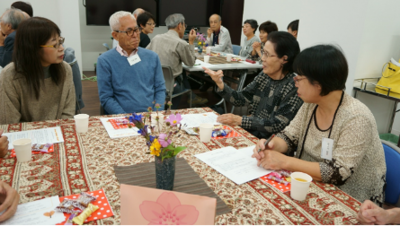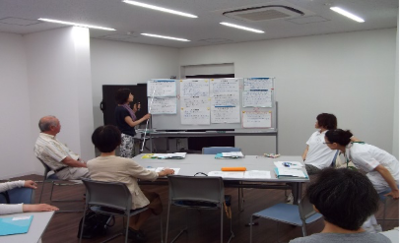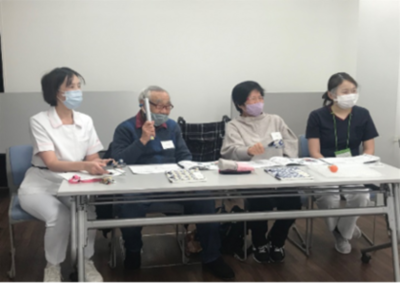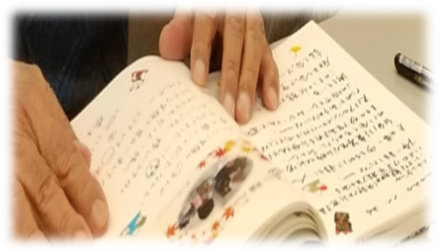The number of people affected by dementia exceeds 50 million worldwide, and is estimated to reach 152 million by 2050 (Alzheimer's Disease International, 2019). The WHO has identified dementia as a global health issue, and proposed a seven-part global action plan as a public health response (Alzheimer's Disease International. 2019). Of the seven parts, "Action area 5: Support for dementia carers” relates to caregiving (Fig1).

Action area 5: Support to dementia carers
Fig1: The World Health Organization has identified dementia as a global health issue
Action area 5 aims to provide families and caregivers of people with dementia accessible evidence-based information, support and training programs, respite services, and other resources in line with their needs, in 75% of the world's countries by 2025.
The objectives of the information, support, and training programs are to improve knowledge and skills (care techniques, non-verbal communication, methods to improve the relationship between the person with dementia and the caregiver), reduce emotional stress, and improve coping, self-efficacy, and health.
To implement evidence-based care for people with dementia and their families, we are conducting the following two action research projects.
Japan's dementia policy not only emphasizes preventing the onset of dementia but also slowing its progression, using a person- and family-centered perspective. One of the most important activities for preventing the Behavioral and Psychological Symptoms of Dementia (BPSD) and reducing the psychological impact on caregivers is family psycho-education. Since 2009, we have been conducting classes for families of people with MCI and dementia.

A scene from a family psychoeducation class

A scene from a family psychoeducation class
Previously, disease education for families often consisted of top-down information provision and individual consultation by medical and health professionals. However, in many cases, the information and knowledge provided by professionals is not immediate or practical and becomes a "waste of time." Therefore, we established the family psycho-education class as a place where people who have the same experience can interact and learn from each other, in addition to gathering information through lectures. We also set the goal of supporting families through the classes (Fig 2).

Fig2: Goal for supporting families through psycho-education
If family members who are struggling with their loved ones’ conditions, the amount of care they provide, and caregiving time are not given support, they are at a higher risk of falling into a linear depression. However, we hypothesized that if caregivers are provided with support through family psychoeducation, we can reduce their stress and interrupt the development of depression.

Fig3: The hypothesis of this action research
This hypothesis is based on Lazarus and Folkman's theory of stress coping: "When people are able to recapture the meaning of a stressful situation, they will try to return to a better state on their own with support.” (Fig 3) We used a scale to quantitatively evaluate the effectiveness of our support, the degree to which participants were able to regain a sense of the meaning of the stressful situation (caregiving emotion assessment and stress coping situation assessment), and the alleviation of the stressful situation (Table 1).

Table1: Methods of measuring the interventions’ effects on participants (main ones)

Table2: Support program for people with dementia
This is the Family Classroom Program (group-based multi-component psycho-educational program), which is managed by an interdisciplinary healthcare team and includes components in the areas of medicine, care, psychology, and social welfare (Table 2). The program is based on adult learning theory, and makes extensive use of case studies, group work, and group discussions to encourage independent learning. Please look at the video to see the actual activities.
After three months of support using this program, the primary effect was a reduction in depression (Fig 4). Other significant effects were observed in feelings about caregiving and caregiving coping.

Fig4: Effect of 3-month intervention
We received many comments from families who participated in the classes.
"I'm worried about leaving the person with dementia at home.”
"The person with dementia goes to a day service, but halfway through the service, he says,
'I want to go home,' and the staff calls me to come and pick him up. I do not feel safe; I cannot attend the family class.”
Therefore, we set up a class in which people with MCI and dementia, and their families can participate together. The program is designed to provide knowledge about dementia and lifestyle-related diseases that are strongly associated with dementia, information about the types of social resources and how to utilize them, useful wisdom for daily life, and ways to relieve stress in daily life. This program also includes a 30-minute activity where people with MCI and dementia, and their family members are separated, creating a situation where people in the same situation can casually talk to each other (Table 3). The effectiveness of the support provided by this program is currently being verified in a randomized controlled trial.

Table3: Support program for people with dementia and their families
Since COVID-19 is currently spreading in Japan, people with MCI and dementia and their families have drastically fewer opportunities to participate in society, and their physical and mental functions, including social isolation and depression, have declined significantly. Therefore, in anticipation of a post-pandemic society, we are continuing this class with strict infection-control measures in place. We are also looking for visitors (using the ZOOM). If you are interested, please send an email to petit-salon[at]*ncgg.go.jp
*[ ]: junk mail prevention

Musical exercise "Tone Catch and Release" using tone chimes

The participants express what they found interesting and enjoyed
about their participation in the event by writing letters, stickers, etc.
in notebooks made of traditional Japanese paper “washi.”